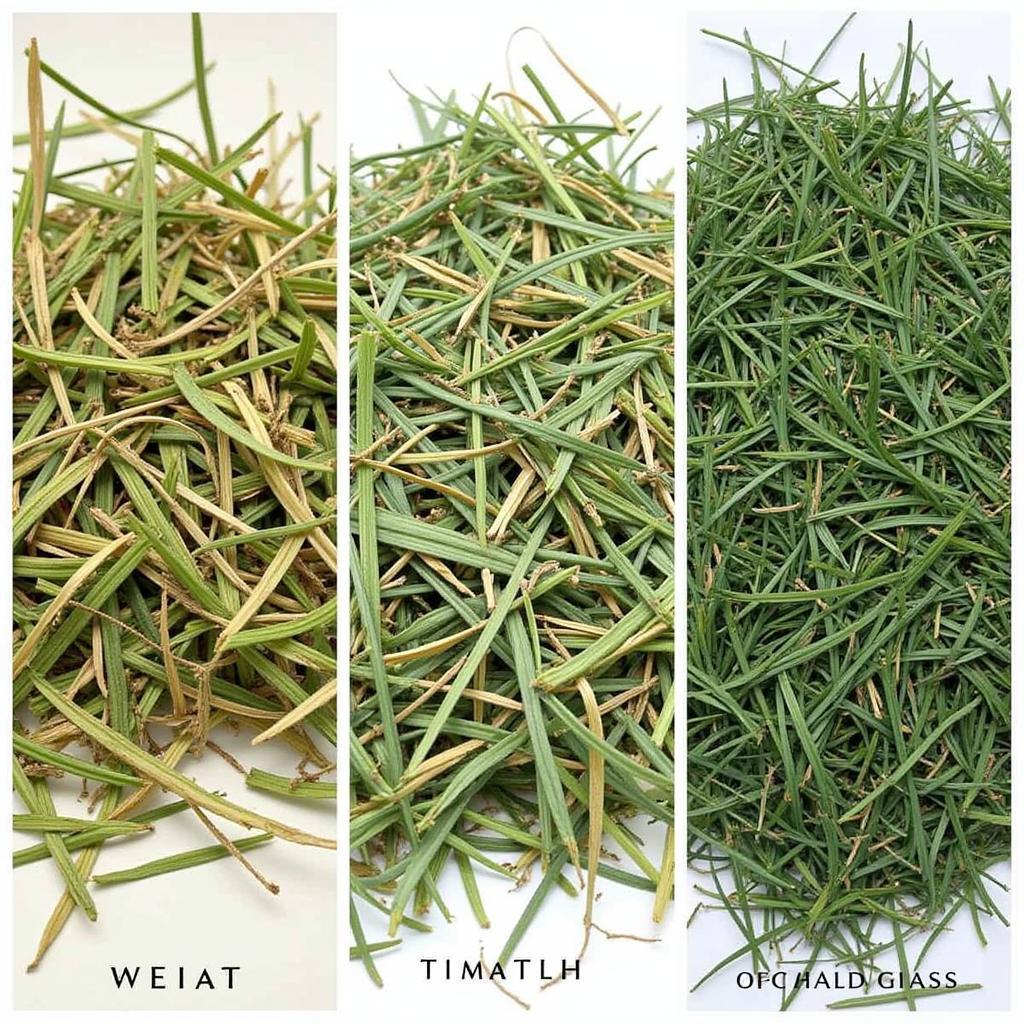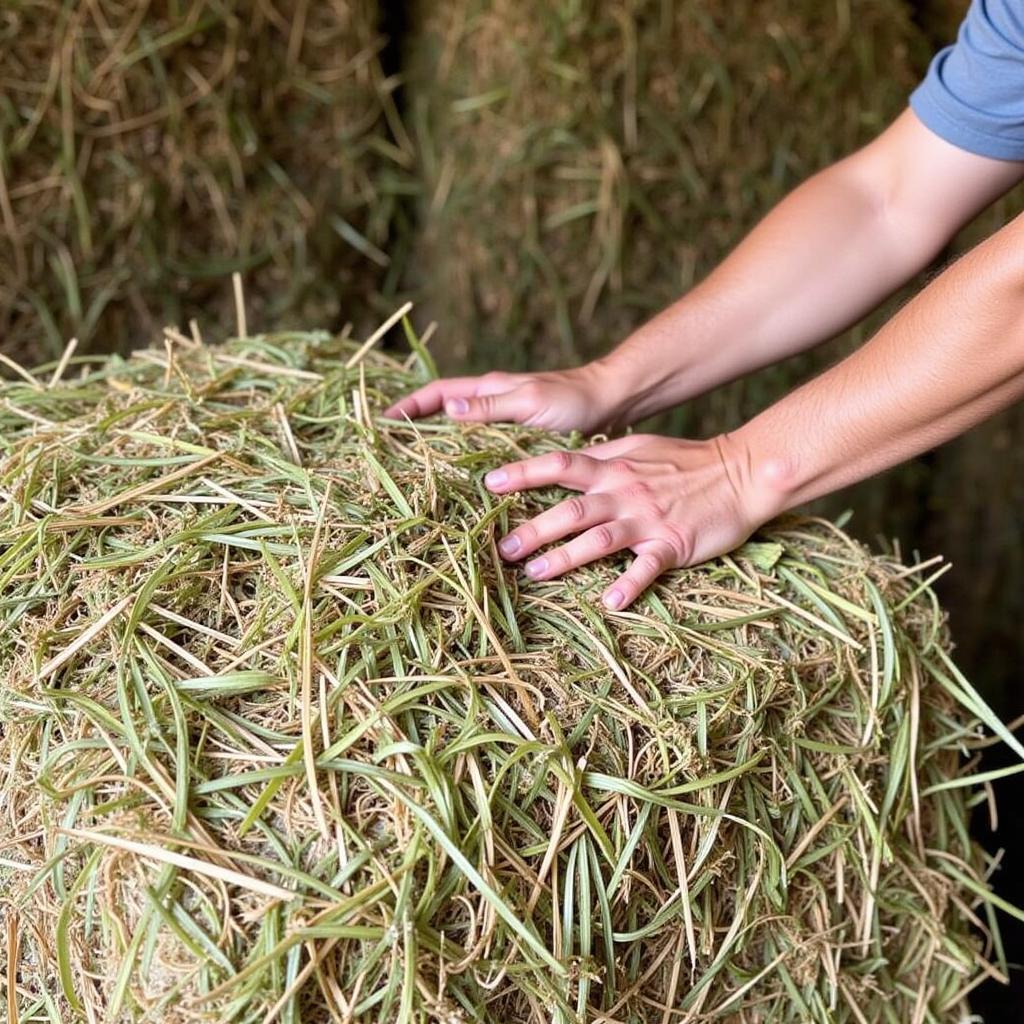Choosing the Best Hay For Horses is crucial for their health, well-being, and performance. Just like humans need a balanced diet, horses rely on high-quality hay as the foundation of their nutritional needs. This comprehensive guide explores the different types of hay, factors to consider when selecting hay, and expert tips on proper feeding practices.
Understanding the Importance of Hay in a Horse’s Diet
Horses are natural grazers, designed to consume a forage-based diet throughout the day. Hay, the dried form of grass or legumes, provides the essential fiber horses need for healthy digestion. A lack of sufficient fiber can lead to digestive upset, colic, and other health problems.
Types of Hay for Horses
There are numerous varieties of hay available, each with its unique nutritional profile. Understanding these differences is key to selecting the best hay for your horse’s specific needs.
1. Grass Hay
As the name suggests, grass hay comes from dried grasses and is generally lower in calories and protein compared to legume hay. Some popular types of grass hay include:
- Timothy Hay: Known for its sweet smell and palatable taste, Timothy hay is an excellent choice for most horses. It’s lower in calories and protein, making it ideal for easy keepers and those prone to weight gain.
- Orchard Grass: This hay is typically softer and more palatable than Timothy hay. It’s slightly higher in protein and calories, making it suitable for growing horses, lactating mares, and those needing to gain weight.
- Coastal Hay: Originating from the coastal regions, this hay is known for its high fiber content and low sugar levels. It’s a suitable choice for horses with metabolic issues or those prone to laminitis.
 Comparing Different Horse Hay Varieties
Comparing Different Horse Hay Varieties
2. Legume Hay
Legume hay, derived from plants like alfalfa and clover, is typically higher in protein, calories, and calcium than grass hay.
- Alfalfa Hay: This hay is an excellent source of protein and calories, making it ideal for performance horses, pregnant mares, and growing foals. However, its high calcium content may not be suitable for all horses.
- Clover Hay: Often mixed with grass hay, clover hay offers a good balance of nutrients. It’s important to note that clover can sometimes cause slobbering in horses.
Factors to Consider When Choosing Hay for Horses
Selecting the best hay involves considering various factors to ensure it meets your horse’s individual requirements.
1. Nutritional Needs
- Age: Growing horses, senior horses, and pregnant or lactating mares have higher nutritional demands than adult horses in light work.
- Activity Level: Performance horses require hay with higher calorie and protein content to support their energy expenditure.
- Health Condition: Horses with certain health conditions, such as metabolic disorders or allergies, may require specific types of hay.
2. Hay Quality
High-quality hay is crucial for your horse’s health. Look for hay that is:
- Fresh: Avoid hay that appears dusty, moldy, or has a musty odor.
- Green: Good quality hay should retain a greenish color, indicating it was harvested at the right time.
- Free from Weeds: Weeds can be toxic to horses, so choose hay that is free from unwanted plants.
 Horse Owner Checking Hay for Quality
Horse Owner Checking Hay for Quality
3. Availability and Budget
Different types of hay have varying availability and costs depending on your location. Factor in these aspects when making your selection.
Feeding Hay to Your Horse
Once you’ve chosen the best hay, it’s essential to feed it correctly. Here are some tips:
- Feed by Weight, Not Volume: Weigh your horse’s hay to ensure they are receiving the appropriate amount.
- Provide Hay Throughout the Day: Horses are designed to graze continuously. Mimic this by offering hay in multiple small meals throughout the day.
- Use a Slow Feeder: Slow feeders can help prolong feeding time and prevent overeating, especially for horses prone to weight gain.
FAQs About the Best Hay for Horses
Q: Can I feed my horse alfalfa hay exclusively?
A: While alfalfa is highly nutritious, feeding it exclusively may not be suitable for all horses due to its high calcium and calorie content. Consult your veterinarian to determine the appropriate amount of alfalfa for your horse.
Q: What is the best way to store hay?
A: Store hay in a well-ventilated, dry area off the ground to prevent mold growth.
Q: How much hay should I feed my horse?
A: As a general rule, horses should consume 1.5-2.5% of their body weight in forage per day. However, the exact amount will vary depending on factors like age, activity level, and the type of hay.
Need More Help?
Choosing the best hay for your horse is essential for their health and happiness. For specific questions or guidance tailored to your horse’s individual needs, don’t hesitate to contact us. We’re here to help! Reach out to our team at [Phone Number], email [Email Address], or visit us at [Physical Address]. We offer 24/7 support because your horse’s well-being is our priority.
Interested in exploring high-quality hay options for your equine companion? Check out our selection of hay for horses for sale. For horses needing controlled feeding, we also offer slow feeder horse hay.
Whether you’re looking for the perfect hay to fuel your California ranch and trail horses or need a reliable source of nourishment, Justus Horses USA is your trusted partner in providing the best for your equine companions. We also offer a range of covered hay feeder horses and hay bale bags horses to make feeding time convenient and efficient.